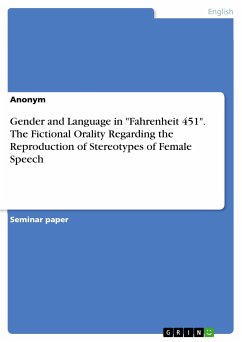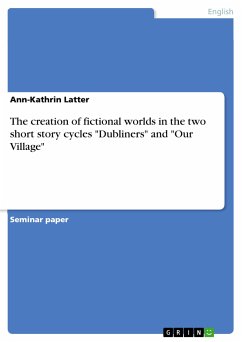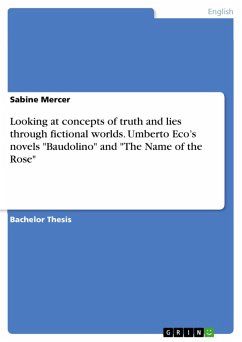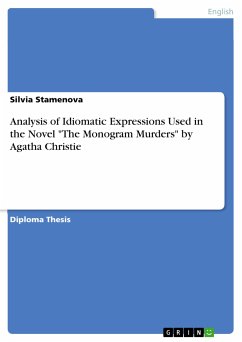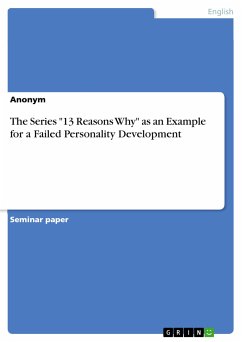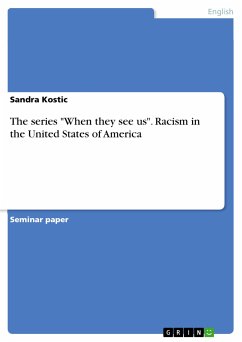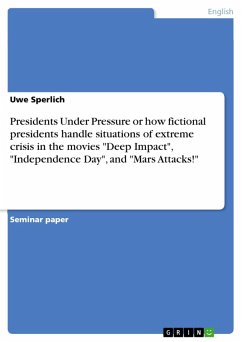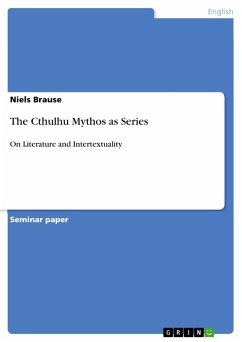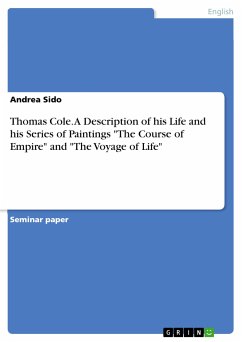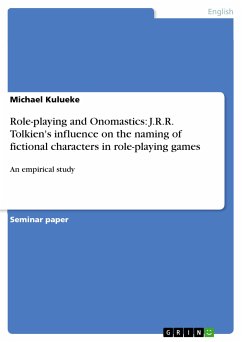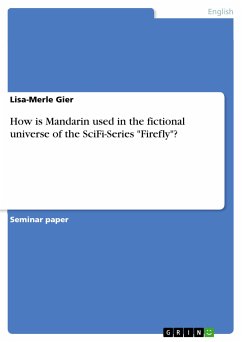
How is Mandarin used in the fictional universe of the SciFi-Series "Firefly"? (eBook, PDF)
Sofort per Download lieferbar
Statt: 15,95 €**
13,99 €
inkl. MwSt. und vom Verlag festgesetzt.
**Preis der gedruckten Ausgabe (Broschiertes Buch)
Alle Infos zum eBook verschenkenWeitere Ausgaben:

PAYBACK Punkte
0 °P sammeln!
Seminar paper from the year 2016 in the subject English Language and Literature Studies - Linguistics, grade: 1,7, Ruhr-University of Bochum (Institut für Anglistik), language: English, abstract: Bilingualism is a frequent phenomenon in our present society, and it is as varied as it is frequent. My subject of research will therefore be the fictional speech community of the SciFi-series "Firefly". In it, the viewer is confronted with a future in which humanity has left Earth-that-was (as the present Earth is called in the "Firefly"-universe) due to extensive pollution and overpopulation and po...
Seminar paper from the year 2016 in the subject English Language and Literature Studies - Linguistics, grade: 1,7, Ruhr-University of Bochum (Institut für Anglistik), language: English, abstract: Bilingualism is a frequent phenomenon in our present society, and it is as varied as it is frequent. My subject of research will therefore be the fictional speech community of the SciFi-series "Firefly". In it, the viewer is confronted with a future in which humanity has left Earth-that-was (as the present Earth is called in the "Firefly"-universe) due to extensive pollution and overpopulation and populated new star systems via terra-forming. Throughout this generation-spanning process of emigration, the languages of the previously geographically separated areas were mixed, resulting in a multilingual society whose main languages are English and Mandarin, presumably the two majority languages on Earth-that-was. In this paper, I aim to uncover some findings about the characteristics of the usage of Mandarin in "Firefly" as well as some insights into the speech community portrayed in "Firefly". As a multilingual society which has developed through a fundamental uprooting and transplanting, it is interesting to examine the visible (or hearable) result of this process. This result will be data gathered from the series, focused on verbal utterances made by the characters of the series (visual signs of Bilingualism like street signs and inscriptions will be omitted). To gain insights on the characteristics of the usage of Mandarin in "Firefly", I will examine the domains in which Mandarin is typically used in conversation, and examine the way in which it is used. As code-switching and code-mixing are a phenomenon which occurs rather often, I will use a numerical approach to create an overview over the number of Mandarin utterances, and analyze them further by comparing my findings with the features found in Holmes 2013. In doing so, I hope to prove that Mandarin seems to be the language which is more easily at the disposal of the speakers, in opposition to English, which seems to be the official language used in everyday situations.
Dieser Download kann aus rechtlichen Gründen nur mit Rechnungsadresse in A, B, BG, CY, CZ, D, DK, EW, E, FIN, F, GR, HR, H, IRL, I, LT, L, LR, M, NL, PL, P, R, S, SLO, SK ausgeliefert werden.




